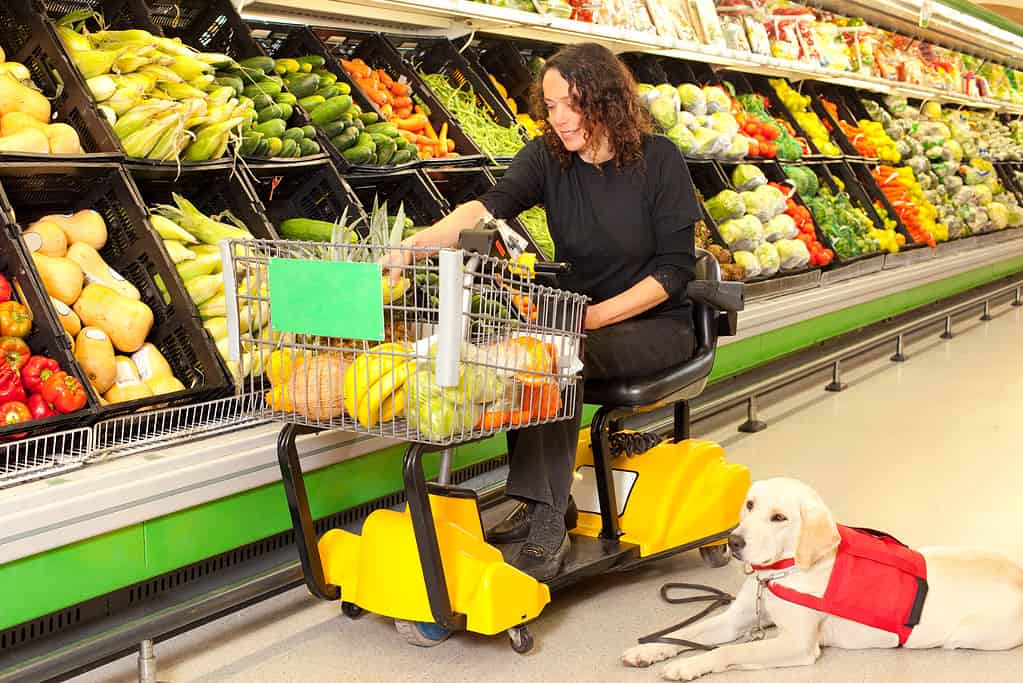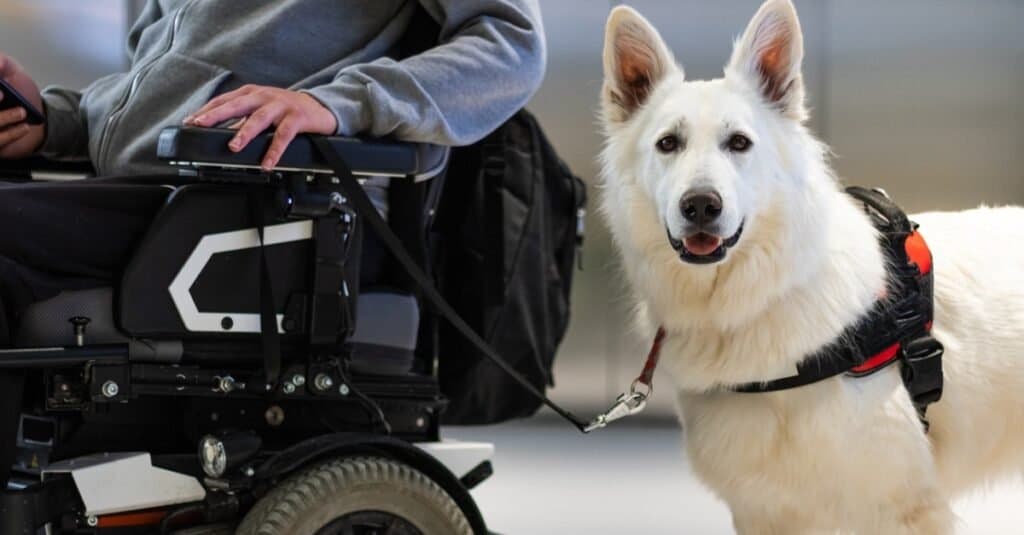Dogs are our best friends, and luckily these days many types of stores celebrate that. Across the country, numerous chain retailers now welcome your well-behaved pet to shop alongside you. But what about if you want to make a grocery run, can you take your dog along with you? Let’s specifically explore if dogs are allowed to enter Whole Foods grocery stores. There are valid reasons why dogs are not allowed in Whole Foods.
Why Can’t I Bring My Dog to Whole Foods With Me?

Even if your pet dog is well-behaved and stays in the cart, they cannot enter Whole Foods.
©Roman Mykhalchuk/iStock via Getty Images
The reason that most grocers don’t allow pets to grocery shop alongside you is because of health and safety regulations from the Food and Drug Administration. Dogs and other pet animals are restricted from entering places where food is produced, sold, or consumed. This includes grocery stores. The regulations are in place to ensure food does not become contaminated. Though your dog may be healthy, these restrictions keep food that customers consume safe from animals that may carry diseases. There is one exception to animals in grocery stores, however.
Can I Bring My Service Dog to Whole Foods?

Whole Foods allows service dogs to accompany their owners while shopping.
©tifonimages/iStock via Getty Images
Whole Foods states on its website that the “no pets” policy does not apply to service animals. Therefore, customers who need the assistance of a service animal are allowed to bring their dogs into Whole Foods. The American Disabilities Act states that a service dog is any breed or size trained to perform a task directly related to a person’s disability. Service animals are legally allowed to enter places that don’t typically allow pets, such as restaurants, hospitals, grocery stores, and schools.
What Defines a Service Dog?
Service dogs are not required to be certified or go through a professional training program, according to the ADA. They also don’t have to wear a vest or anything indicating their service.
This can lead to a slippery slope as workers are also not allowed to ask about the owner’s disability or for documentation. However, employees may ask what task the dog is trained to perform. Depending on what state you live in, your service dog may be required to be vaccinated and licensed.
Are Emotional Support Animals Allowed in Whole Foods?

Emotional support animals do not get the same grocery store shopping privileges as service animals.
©skrotov/iStock via Getty Images
The ADA defines ESAs, otherwise known as emotional support animals, as providing companionship, relieving loneliness, and helping with depression, anxiety, and some phobias. However, they are not trained to perform a task that assists a person with disabilities, so are not considered service animals. ESAs are not legally allowed to enter Whole Foods stores based on this definition.
Rules for Service Dogs in Whole Foods

Service dogs always need to be under the control of their owner.
©24K-Production/Shutterstock.com
Even service dogs have to behave themselves in Whole Foods. Otherwise, it’s within the law for a store to ask a customer to remove their service dog if they are:
- Not housebroken. If a service dog goes to the bathroom in a grocery store, it might affect the health and safety of other customers.
- The dog cannot be controlled. A dog that’s not under the control of its owner affects the shopping experience of other customers. Whether the dog is barking, behaving viciously, or generally disturbing people, the owner can be asked to take it out. One caveat to this is if it is within the realm of the dog’s training to bark as a medical alert.
Other Things To Keep in Mind for Service Dogs:
- Service dogs must be leashed, tethered, or harnessed. A service dog is not allowed to run free in a store.
- The dog should be vaccinated according to local law. Also, all dogs must be vaccinated for rabies according to federal law.
- Finally, if a service dog accidentally makes a mess, the owner is responsible for cleaning it up. This can range from bathroom accidents to knocking something over.
You may wish you could take your pet dog to Whole Foods just like you can to other stores. But as you can see, there are valid reasons why only service dogs are allowed.
Ready to discover the top 10 cutest dog breeds in the entire world?
How about the fastest dogs, the largest dogs and those that are -- quite frankly -- just the kindest dogs on the planet? Each day, AZ Animals sends out lists just like this to our thousands of email subscribers. And the best part? It's FREE. Join today by entering your email below.
Thank you for reading! Have some feedback for us? Contact the AZ Animals editorial team.








